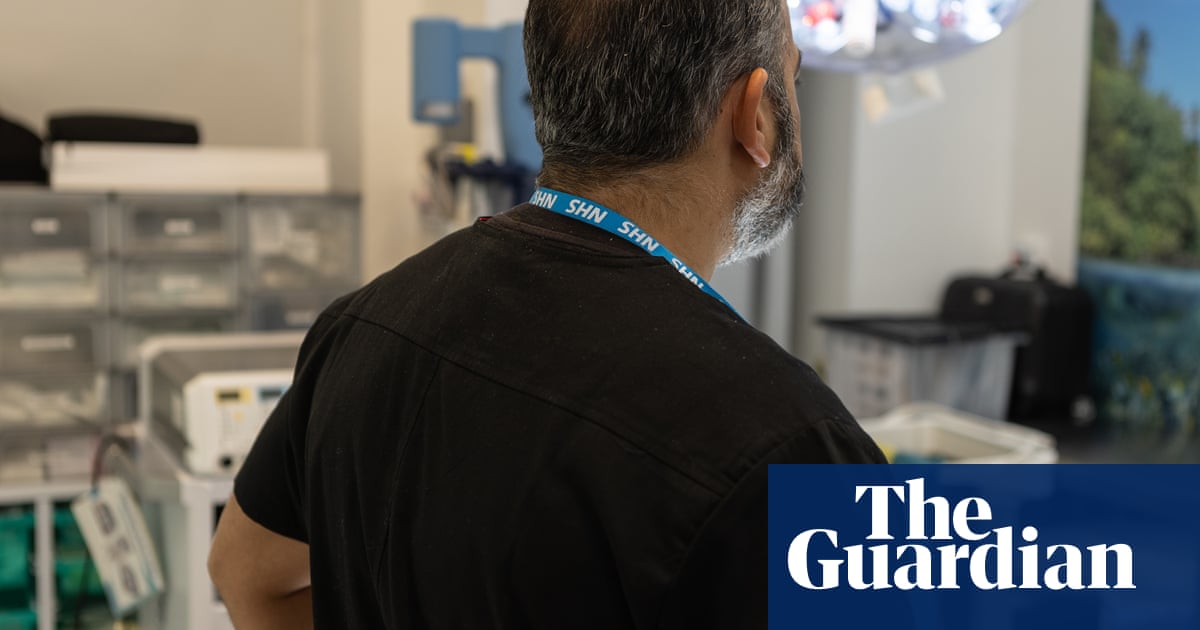Mohammad’s family spent four dayssearching for him after he became separated from his uncles at a food distribution point in northern Gaza. They clung to the chance that he had been arrested by theIsraelDefense Forces, as the boy was not among the corpses recovered after troops opened fire.
But eventually they found his body mutilated beyond recognition, identifiable only by his electrician father’s work shoes. Mohammad was 16, and his family had not seen a bag of flour for more than a month. His uncle Mo, who was born in Jabaliya, northernGaza, received news of his nephew’s disappearance in the UK, where he has worked as an NHS consultant for the past 20 years.
Speaking to the Guardian, he described the circumstances of his nephew’s “deliberate killing” as “like a trap”.
He added: “People are completely desperate so they do risk their lives to go and get some food for their families, but then they die. He’s only a little story of thousands of other stories of people like that – just extermination.”
As of 17 June, 397 people have been killed and at least 3,031 injured trying to access food supplies, according to theUN Office for the Coordination of Humanitarian Affairs and the Gaza ministry of health.
The total death toll in Gaza has surpassed 56,000 since the war broke out, and humanitarian organisations continue to face major obstacles bringing in aid and assistance, with thecollapse of water systemsnow threatening drought and hunger.
Before a two-month ceasefire was shattered by Israel in March, Mo’s other 16-year-old nephew was killed and earlier this month, his 52-year-old cousin Atif, a father of nine, was killed by a drone as he retrieved water for his family.
Mohammad’s remains were buried by his family in Jabaliya days after recovering his body.
The bombardment continues day and night in Jabaliya, Mo said, and his family is devastated and hungry. Relatives have been killed and wounded by previous Israeli strikes, and with nowhere to go, his mother recently said it would be more merciful if they were killed by a nuclear bomb.
Every morning, Mo, who has not been able to see his mother for 13 years, fears news will come that more ofhis family have been killed. “We shouldn’t wait until everyone in Gaza is dead. It’s never too late,” he said. “Something must be done. Nothing is going to stop Israel but action.”
“We continue to see people killed at these so-called aid distribution points,” Rohan Talbot, the director for advocacy and campaigns at Medical Aid for Palestinians (MAP), told UK parliamentariansearlier this month.
Talbot and representatives from other humanitarian organisations gave evidence to the foreign affairs committee about Israel’s attacks on Palestinians in the occupied West Bank and Gaza, including mass casualtiesat food distribution points.
“The situation is completely catastrophic,” said Talbot.
Throughout the conflict, the charity has sent volunteer medic teams into Gaza, who have shared testimony with the Guardian of the deliberatetargeting of healthcare workersandinfrastructure.
Mo had volunteered for a trip last year which was later cancelled, which he said was a result of the IDF not allowing him to enter Gaza with Palestinian identification.
The British MPLayla Moransaid Mo’s story is a heartbreaking reminder of how deeply betrayed many British Palestinians feel by their own government’s inaction.
She said: “The government’s continued failure to act decisively in Gaza has allowed the horror to spiral into something unconscionable. The scale of destruction is unimaginable, and the human cost is something that can never be undone.”
Moran, who is also Palestinian, met Mo afterhe operated on her last year. She has raised his case in parliament andcontinues to urge the governmentto halt all arms sales to Israel, end trade with illegal settlements and recognise the state of Palestine.
A Foreign Office spokesperson said: “Reports of shootings near aid delivery centres are appalling and highlight the desperate need to get aid into Gaza. Israel must allow partners to operate in line with humanitarian principles and deliver lifesaving aid.”
In May,the UK suspended trade negotiations with Israel, condemning the refusal of aid into the territory and calls by Israeli cabinet ministers to “purify Gaza” as extremist. Although Moran has welcomedthe government’s recent shift in tone, words alone, she said, are not enough.
“We cannot allow history to remember us as silent when our voices could have made a difference,” said Moran.
But for Mo, the UK government’s recent shift has come too little, too late.
He said: “I think they should be ashamed that they have not used their leverage on Israel until now. They should be ashamed because they have power to prevent this, not only militarily but also diplomatically.”
The IDF has been approached for comment.
